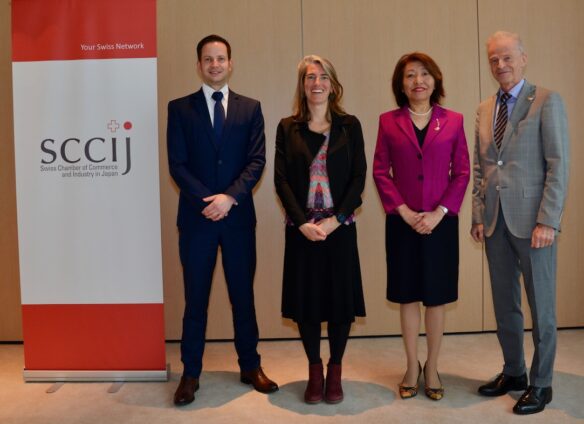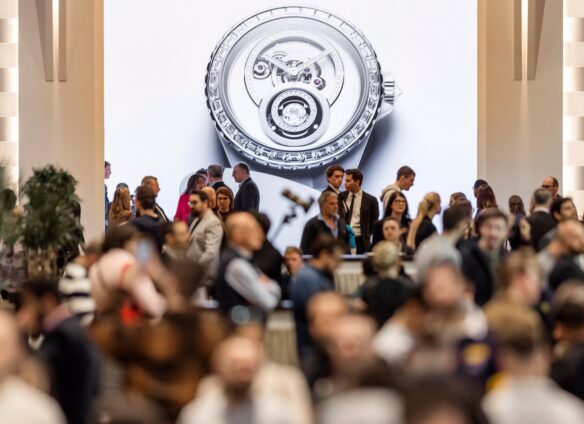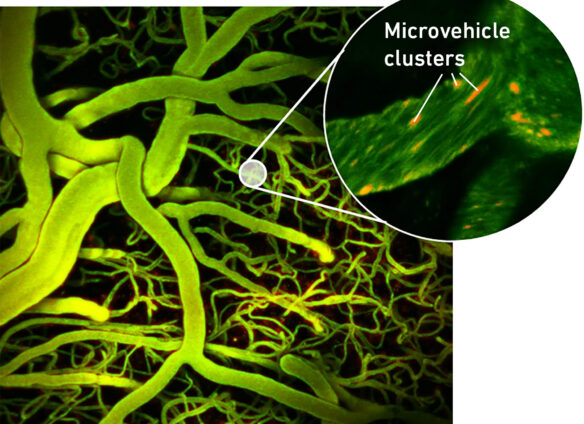Tokyo (SCCIJ) – The Swiss chief executive of Hitachi Automotive Systems, Brice Koch, amazed about 60 members and guests of the SCCIJ with deep insights into the “Hitachi journey” and the endeavors of the Japanese group in the automotive market. The Swiss who has two decades of managing experience was hired last year by Hitachi to speed up the globalization of the automotive division. Koch described himself as a wanderer between two worlds who has to globalize Hitachi Automotive without losing the Japanese roots. Otherwise, the company would be in danger to become irrelevant, he warned.
Successful turnaround
The luncheon speaker started his talk with the anecdote that his 91-year-old mother was familiar with the brand name of Hitachi when he told her about his new assignment. This would throw a spotlight on the long history of this Japanese corporate group. “Hitachi started in 1910 with electric motors and is now coming back to its own roots with e-motors for electric vehicles,” Mr. Koch said.
More recently though, Hitachi was one of the victims of the Great Financial Crisis. After the Lehman shock, the Japanese group lost more than $7 billion which almost killed it. But the turnaround was quick and successful, embarking then on a stronger globalization journey. “We need now to accelerate because markets are moving faster than us”, Mr. Koch explained.
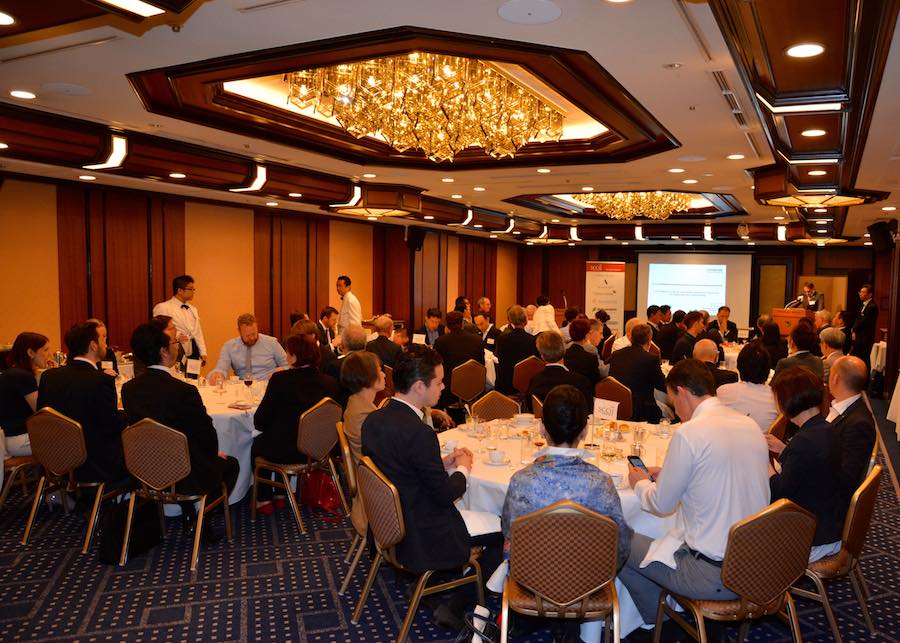
Second SCCIJ June Luncheon
Fundamental competencies
The main advantage of Hitachi would be the combination of three fundamental competencies, the speaker said: “We know how to manufacture products, we know software (IT) and we know how to optimize processes (OT).” The automotive division of Hitachi represents about 10% of the group’s sales equaling 1,001 billion Yen ($9.1 billion) in the fiscal year 2017. About 60% of its sales came from outside of Japan. “Our competitors are three to five times bigger, so we have some homework to do,” the Swiss chief executive said.
His company has to address several trends which impact the automobile industry: to reduce emissions – today’s new cars produce more than one third less CO2 emissions per kilometer than in the early 2000s; to provide ubiquitous connectivity – it becomes increasingly affordable and heightens the value of the vehicle through updates of its firmware; to increase road safety – active systems could reduce fatalities by up to 90%; to adapt to the sharing economy – disruption of car ownership as the result of new business models.
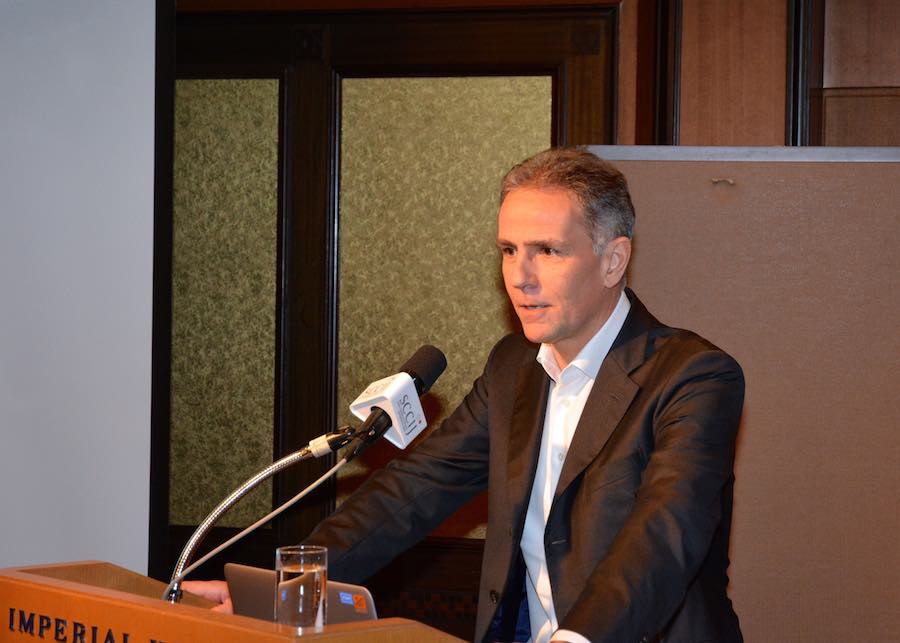
Second SCCIJ June Luncheon speaker Dr. Brice Koch, CEO of Hitachi Automotive
Unknown automotive future
“All car brands now want to become mobility providers but their future business models are still to be found, especially due to changing technologies and customer behavior,” Mr. Koch said. At the same time, the car industry had to invest into the future. “How do you get the payback if you do not know the future – this is the big question the carmakers are faced with,” the Swiss said. For example, in contrast to combustion engines, carmakers will have difficulties in differentiating themselves with electric engines. “With shared cars, the brand also becomes less relevant,” he added.
The challenge for automotive suppliers like Hitachi stems from the fact that software becomes more and more relevant and even critical. The more than 100 million lines of software code in a current vehicle exceed the number of code lines in a Boeing 787 already by factor 10. By 2020, the number will exceed 200 million code lines. At the moment, Hitachi Automotive generates 40% of its sales in integrated chassis control systems, 40% in engine management systems and 20% in car information systems.
These businesses would have to adapt to the new trends quickly. “Despite all this, it is attractive to work for the car industry”, Koch said. In contrast to the past, car managers would now be the good guys because they are fixing problems instead of causing them, for example for the environment. He would be encouraged in his task because of the commitment of his employees and the very high and deep, but often hidden level of technologies at Hitachi Automotive Systems.
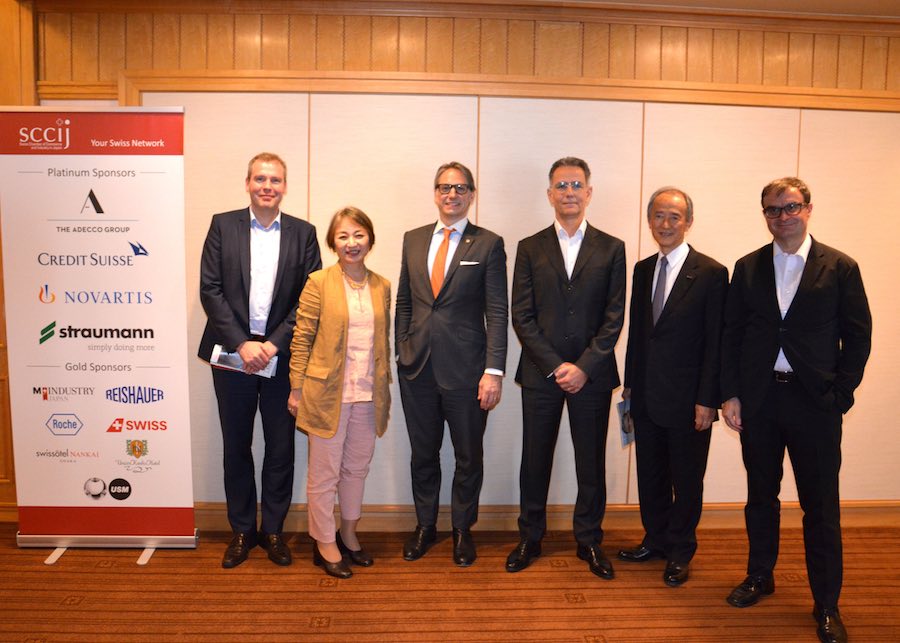
Members and advisors of the SCCIJ Executive Committee with luncheon speaker Dr. Koch
Improvement opportunities
Among the improvement opportunities of Hitachi Automotive, he named the mentality of incremental improvement instead of “play to win”; the silo acting which may reduce management span would require simplification; instead of being a domestic group playing globally, the company would need to become a more globally thinking company while building on its Japanese roots. “Also, our mindset needs to evolve from the current factory and product culture to more solutions and services offering,” Mr. Koch said.
In his summary remarks, the Swiss boss of Hitachi Automotive concluded: “We are trying to build on the very strong Japanese values and add a little bit of more global strengths.” It would also require focusing, building scale, synergizing more, simplifying and partnering with other companies, aiming at leadership in all what we do,” the executive emphasized. In the Q&A section, he clarified that in order to achieve these goals he would need to stay who he is to bring the value he is supposed to deliver. “90% of my time is very exciting, and 10% of my time I am saying: Come on guys, speed up,” he summed up his feelings.
About the Luncheon Speaker
Dr. Brice Koch is the President & CEO of Hitachi Automotive Systems, Ltd. Dr. Koch studied mechanical engineering with a specialty in economics and received a Ph.D. in material science from the Swiss Federal Institute of Technology in Zurich. He worked 19 years at ABB in different businesses, joining the Group Executive Committee at the beginning of 2010.
At the beginning of 2014, he became Group CEO of the Swiss-listed high technology conglomerate OC Oerlikon Ltd. After spending 3 years at OC Oerlikon Ltd, he joined Hitachi, Ltd. in 2017 as Executive Advisor to CEO. Since then, he has been based in Tokyo and in April 2018, he became President and CEO of Hitachi Automotive Systems, Ltd.
Text and photos: Martin Fritz for SCCIJ




